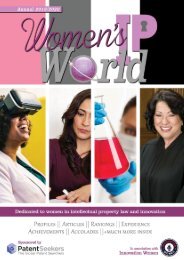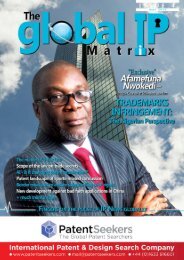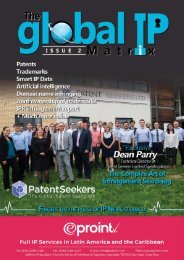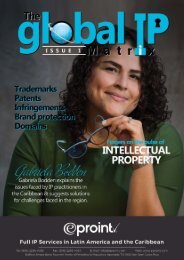Global IP Matrix - Issue 8
Dear Readers We are delighted to present you with issue 8 of The Global IP Matrix magazine! Once again, we have fantastic content delivered to you by industry professionals who are experts in their field. This issue explores IP & Innovation in Africa, anti-counterfeiting measures in the Caribbean, IPR Infringement in China, plus many more engaging articles around the IP ecosystem. It's been a challenging few months; however, we are grateful that our clients and contributors share our vision. Together, we are heading for better times. We cannot thank our authors enough for their time and efforts to keep you, our audience up to date with news and stories from their own perspective and expertise. Look out for our next edition, in January 2021 and until then, stay safe, healthy & happy. Elvin Hassan – Editor
Dear Readers
We are delighted to present you with issue 8 of The Global IP Matrix magazine!
Once again, we have fantastic content delivered to you by industry professionals who are experts in their field.
This issue explores IP & Innovation in Africa, anti-counterfeiting measures in the Caribbean, IPR Infringement in China, plus many more engaging articles around the IP ecosystem.
It's been a challenging few months; however, we are grateful that our clients and contributors share our vision. Together, we are heading for better times.
We cannot thank our authors enough for their time and efforts to keep you, our audience up to date with news and stories from their own perspective and expertise.
Look out for our next edition, in January 2021 and until then, stay safe, healthy & happy.
Elvin Hassan – Editor
Create successful ePaper yourself
Turn your PDF publications into a flip-book with our unique Google optimized e-Paper software.
Scan the QR code and
listen to our latest issue
in audio Format!
b. Licencing
Section 51 of the Copyright Act defined
broadcast as sound or television broadcast
by wireless telegraph or wire or both, or by
satellite or cable programmes and includes
re-broadcast.
The National Broadcasting Commission
Act of Nigeria, LFN 2004, in section 2 gave
powers to the commission to receive, process,
consider applications for the establishment,
ownership, or operation of radio and
television stations, including cable television
services, direct satellite broadcast, and any
It would appear that the NBC Act covers
internet channels since the use of the internet
is made possible by satellites/WIFI, cables, etc.
Even Android phones or Phone Apps used in
watching cinematograph films survive by data,
WIFI, Satellite, etc. Also, the broadcast has
been defined to include re-broadcast.
The 2016 NBC Code is under review and said
to be undergoing the Presidential approval. It
is believed that the review would affect non-
Nigerian broadcast channels like Netflix and
Amazon Prime so that these entities would
require a licence as well.
photographs; whereas the WPPT deals with
protection for authors rights of performers
and producers of phonograms. Both Treaties
require countries to provide a framework
for the protection of those fundamental IP
rights over the internet. Right-holders should
effectively use technology (i.e., encryption
and other anti-circumvention) to protect their
rights and give licence of their works online.
Unfortunately, the Treaties do not cover the
field. Signal piracy takes various forms. It
could be physical or virtual; an unauthorised
redistribution of signals online is possible
through hacking into encrypted pay-tv signals
Intellectual Property News Direct From the Source!
Power is gained by sharing knowledge, not hoarding it.
To share your news, views and stories. Contact us today.
info@gipmatrix.com ot call +44 (0)203 813 0457
www.gipmatrix.com
other medium of broadcasting. No person
can operate in any of the mentioned services
unless by the provisions of the Act. It is to be
noted that NBC is precluded from granting
a license to religious bodies and political
parties.
Of interest is section 9 of the NBC Act; it
states that the commission must be satisfied
that the applicant is a body corporate
registered under the company and allied
matters Act or owned by the Federal
State, or Local Government. In addition,
the applicant must demonstrate to the
Commission’s satisfaction that he is not
applying on behalf of foreign interest, and can
comply with the objectives of the National
Mass Communication Policy as applies to
the electronic media, that is, radio and
television.
This above provision brings much confusion
as to whether or not online streaming falls
under broadcast to be regulated by the NBC.
Hence, the making of the NBC Code to spell
out the confines of the NBC powers.
According to the National Broadcasting
Commission Code (6th edition 2016), chapter
11:15:1 to 11:15:5 of the NBC Code provides:
An Internet radio, or television
broadcaster streaming signals from Nigeria
shall be licenced by the Commission. All
regulations governing news, programmes,
advertising, and sponsorship shall apply
to this category of broadcasting. The local
content for this category of a licence shall
be 60 percent. All conditions governing
other categories of the broadcast license
shall apply to this category of broadcasting.
All subscription internet radio, and
television that seek subscribers in Nigeria
shall be licensed by the Commission.
c. Assignment/
procurement
Copyrights are considered moveable property
capable of transfer. As such, instead of going
through the difficulties of sourcing and royalty
payment issues, a streaming company can
simply procure the entire ownership rights in
a work just like Netflix bought ‘Lion Heart”
from Genevieve Nnaji. Such a method comes
with great expense, but much more is to be
recovered if the content is worth it.
In such situations, the original author must
always be mentioned, and the integrity of the
work left intact, but ownership would rest on
the company. The owner may then use such
content as they please, including the right to
licence the same at a price to other bodies.
The contract must be appropriately worded
and made to cover every intellectual property
derivable in the work.
3. Trouble From
International Realm
a. International Treaties
The World Intellectual Property Organisation
(WIPO) administers the WIPO Copyright
Treaty (WCT), the WIPO Performances and
Phonogram Treaty (WPPT). Both treaties,
which became referred to as the ‘Internet
Treaties’ 1996, set down international norms
for accessing and using creative works on
the internet/digital networks. These treaties
serve as an update to the existing Berne
Convention, Rome Convention, and by
extension, TRIPS. The WCT deals with
protection for authors of literary and artistic
works, such as writings and computer
programs; original databases; musical works;
audio-visual works; works of fine art and
www.gipmatrix.com
in set-top boxes. An example is live sports
broadcasts. Sports stakeholders are lamenting
over a considerable loss of millions of dollars
of income. The Internet Treaties were found
wanting in the face of new broadcasting
technologies. Digital programme recording
devices, VOD (video on demand) services,
Internet Protocol TV (OPTV or Internet TV)
are all disruptive means that can transmit
programmes to televisions and computers and
mobile phones.
The discussion in WIPO as of 2006 on
webcasting, that is, broadcast over the
internet or video content intended for
internet streaming, yielded no result. There
were concerns regarding blocking legal uses
of a TV broadcast, streaming for personal,
scientific, and educational uses, inhibition
of technological innovation, an extension of
allowed years of protection, and interruption
of specific domestic laws.
b. Experience from
Developed Countries
Article 3 of The Harmonisation of Certain
Aspects of Copyright and Related Rights in
the Information Society (European Union)
mandates certain requirements for online
streaming services - Authors shall have
the exclusive right to authorise or prohibit
any communication to the public of their
works, by wire or wireless means, including
the making available to the public of their
works in such a way that members of the
public may access them from a place and at
a time individually chosen by them. Also,
it stipulates that ‘the rights referred to in
paragraphs 1 and 2 shall not be exhausted by
any act of communication to the public or
making available to the public as set out in
this Article.’
29












